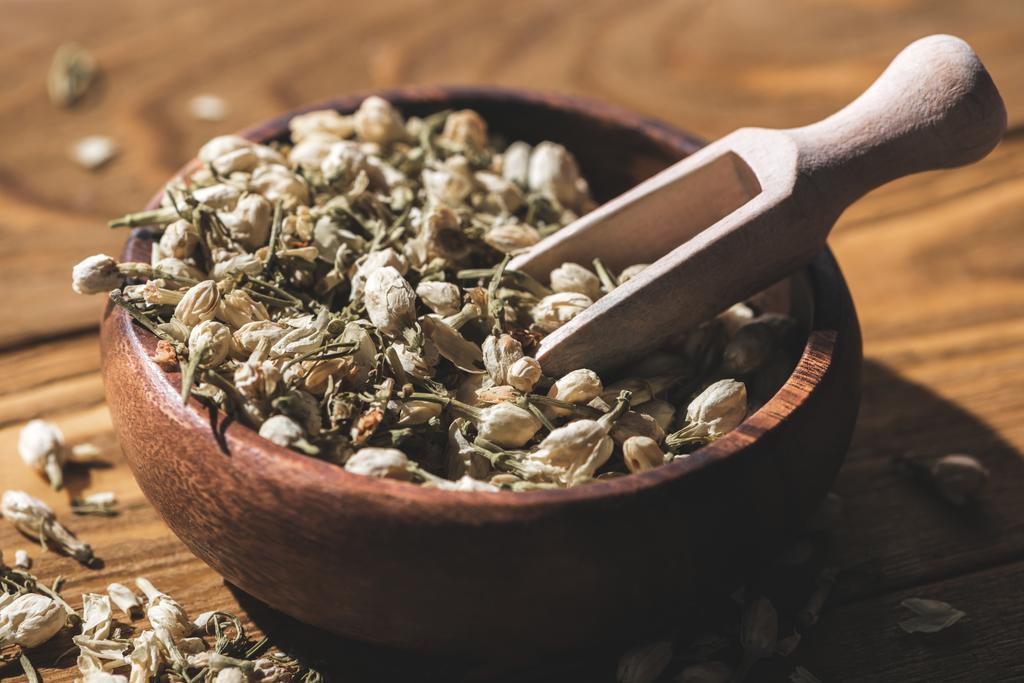Thanks to its incomparable scent, jasmine tea is a special kind of pleasure. But it also has many health benefits. Here you can find out what effect jasmine tea has and how it is used.

Jasmine tea: When flowers and tea “marry”
Jasmine tea is a blend of jasmine flowers with (mostly) green tea. The addition of jasmine gives the green tea a special aroma. Originally, jasmine was supposed to enhance less high-quality teas. In the meantime, however, jasmine tea is considered a particularly fine tea specialty.
The tea is made using different methods: either whole flowers are added to the green tea or the tea is flavored with the rising steam of a jasmine flower bath.
However, there are clear gradations in quality, depending on how the jasmine flowers are selected and how often they are mixed with tea. Incidentally, these mergings are called “weddings” and take place in late summer, when the jasmine blossoms are ripe and the green tea, picked in the spring, comes out of its storage. The more often blossoms and tea are “married” together, the more intense the jasmine blossom aroma.
Effect and ingredients of jasmine tea
Jasmine tea not only smells and tastes good, but also has positive effects on health. This is due to the many valuable ingredients in jasmine tea. Jasmine tea contains, among other things:
vitamin A, B12, and vitamin C,
minerals such as fluorine, magnesium, potassium, copper, and nickel,
Saponins, i.e. plant substances that serve as defensive substances for plants and therefore have anti-fungal and anti-microbial effects.
Tannins: These are also plant substances which, according to studies, have an anti-microbial effect.
Furthermore, jasmine tea has EGCG, i.e. epigallocatechin gallate, a substance that has been shown in a study to reduce the rise in blood sugar after starchy meals.
The essential oils contained are said to have a positive effect on mental and spiritual well-being.
Jasmine tea is used in so many different ways
You can use the tea to support your well-being in many areas:
Jasmine tea strengthens the immune system
Jasmine tea supports the immune system due to its antioxidant properties. Scientists have found that jasmine tea contains a wealth of antioxidant substances that support the immune system in the body’s protective function against free radicals. The immune system is the first “barrier” in the body that viruses and bacteria have to overcome.
Jasmine tea promotes weight loss
A study from Dalhousie University, Canada, showed that the many antioxidant properties of green tea (the most common base tea that jasmine flowers are mixed with) can also help with weight loss. The antioxidants boost the metabolism, which means that physical activities are more effective and the body can process food faster.
Of course, weight reduction results from the interaction of healthy nutrition and exercise. However, jasmine tea can help to optimize the metabolism and thus achieve the desired result more quickly.
Jasmine tea supports heart health
According to a study, the catechins found in jasmine tea play an important role in heart health. The catechins can help to prevent LDL oxidation. This is a process by which the “bad” LDL cholesterol in the arteries changes through oxidation, which can lead to inflammation in the body. This inflammation can lead to heart attacks or strokes. The catechins can inhibit this oxidation and thereby prevent high blood pressure [R] and reduce blood lipid levels.
Jasmine tea reduces stress
Jasmine tea can also have a positive effect on a psychological and emotional level: Many sensations are triggered via the sense of smell and, according to a study, the aroma of jasmine tea has a calming effect on the mind. Enjoying a cup of jasmine tea not only warms you from the inside, but also exudes a scent that makes you calm and relaxed.
Tea: a problematic indulgence?
A cup of tea exudes a lovely scent and provides inner warmth and a feeling of well-being for body and soul. For us, a cup of tea means a brief moment of pleasure, but for many others, the downsides outweigh the downsides when it comes to tea.
Tea production often cannot do without the exploitation of those who work on the tea plantations. Wages well below the living level, discrimination, and appalling living and working conditions for workers are the order of the day. In addition, there are ecological grievances in conventional tea cultivation, because large amounts of pesticides are used in most fields, which harm people and the environment.

